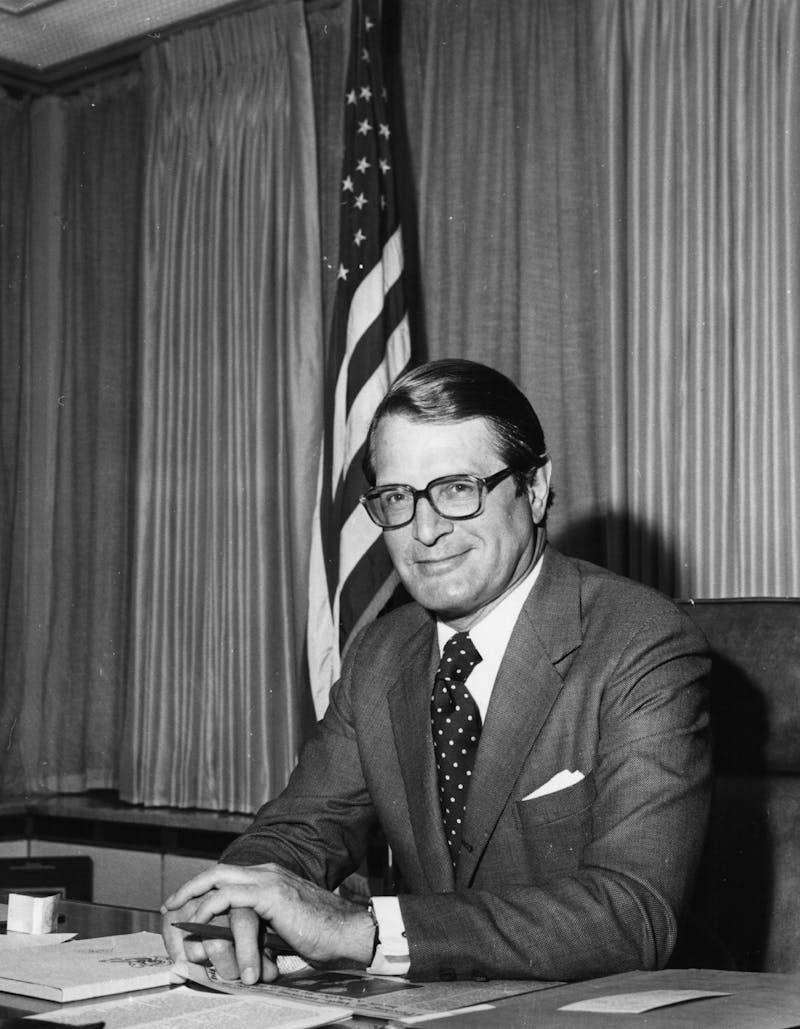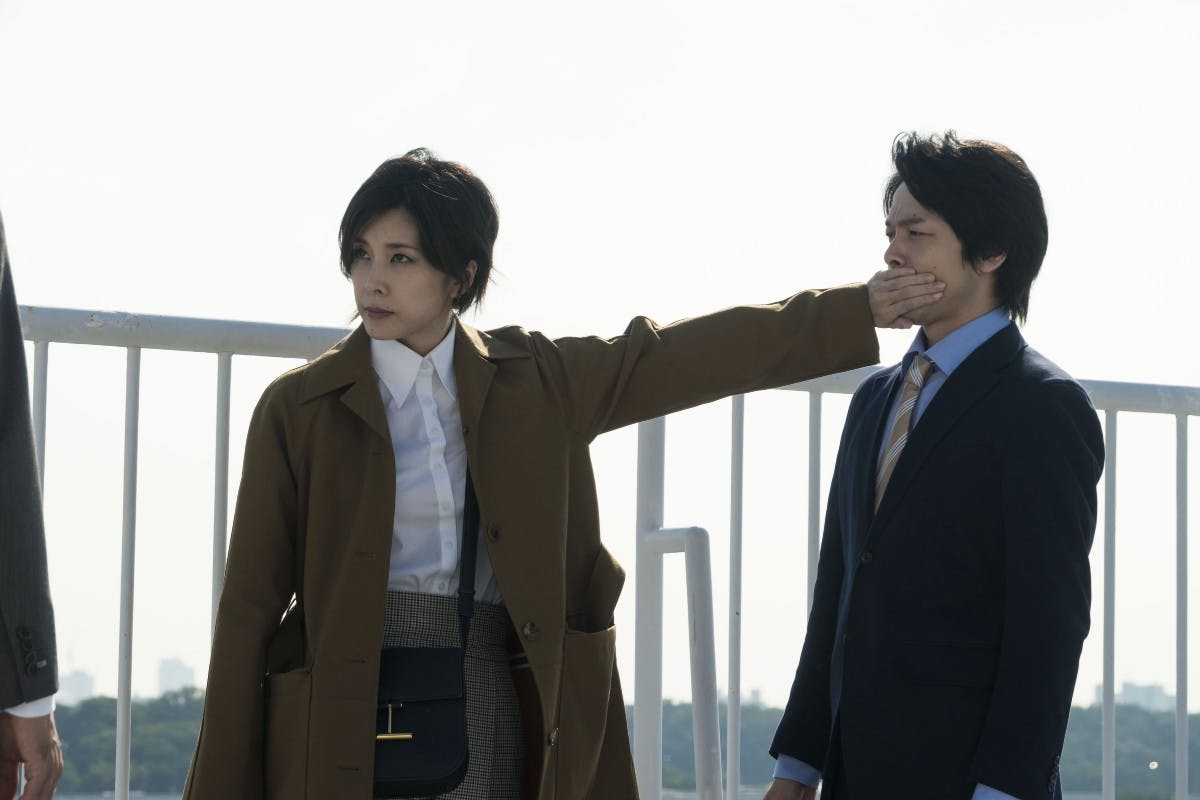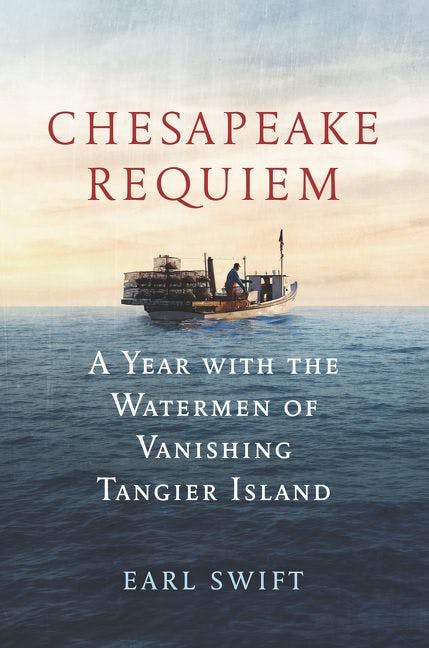
It’s virtually certain that President Donald Trump will fire Attorney General Jeff Sessions by the end of the year. In an interview with Bloomberg News on Thursday, the president said he wouldn’t replace the former Alabama senator before the midterm elections—a tacit admission that it would be too politically damaging to do it any sooner. “I just would love to have him do a great job,” Trump said. “I do question what Jeff is doing.”
The White House will likely contrive a rationale to oust Sessions, perhaps by (rightly) blaming him for the family-separation immigration crisis. But the real reason for his eventual removal is obvious and irrefutable: Trump sees two federal criminal investigations—one led by special counsel Robert Mueller in Washington, the other by career prosecutors at the U.S. Attorney’s Office in Manhattan—as a dire threat to him and his inner circle. The sense of anxiety and paranoia that radiates from the president’s Twitter feed only grew after Michael Cohen, his former personal attorney, implicated Trump in campaign-finance crimes earlier this month.
Republican senators signaled last year that removing Sessions would cross a red line. South Carolina’s Lindsey Graham promised there would be “holy hell to pay” if Trump fired him, while Iowa’s Chuck Grassley, who chairs the Judiciary Committee, curtly noted that there was no room in the committee’s schedule to confirm a replacement. This month, they changed their tune. Graham told CNN earlier this week that the Senate could find a suitable replacement after the midterm elections, while Grassley acknowledged that he could find the time to approve Sessions’s successor.
There is precedent for replacing an attorney general midway through a major investigation into White House misconduct. There is also precedent for the Senate to impose conditions on an attorney general in such a scenario.
On the night of April 30, 1973, Richard Nixon tried to put the entire Watergate scandal behind him. He announced that he had accepted the resignation of two White House aides, chief of staff H.R. Haldeman and domestic-policy adviser John Ehrlichman, and fired White House Counsel John Dean. Nixon framed the shake-up as an effort to restore public confidence in his administration. “This office is a sacred trust and I am determined to be worthy of that trust,” he told the nation in a televised address.
To that end, Nixon also announced his most consequential move that night: the departure of Attorney General Richard Kleindienst, who had close personal ties to many of the Watergate conspirators. To replace him, Nixon turned to Secretary of Defense Elliot Richardson. It was a choice straight out of central casting. Richardson, a well-respected 56-year-old lawyer, had clerked for Supreme Court Justice Felix Frankfurter and served as the attorney general of Massachusetts. He was also everything Nixon was not: tall and handsome, a Yankee patrician in bearing and a Boston Brahmin in demeanor. Christopher Reeve could have played him in a movie.
Events would later prove that Richardson was not a “Nixon man,” as the president’s first attorney general John Mitchell and the rest of the Watergate conspirators had been. But Congress had no way of knowing this at the time. Richardson had already held two cabinet positions in the Nixon administration, starting with a three-year stint as secretary of health, education, and welfare. The Senate had confirmed him to lead the Pentagon only five months before Nixon nominated him to run the Justice Department. Richardson clearly appeared to be someone whom Nixon trusted.
“These are not men of detachment from outside the administration, of the type the situation requires,” The New York Times editorial board wrote after Nixon announced the executive branch shake-up. “Mr. Nixon seems to think Mr. Richardson, in particular, as a kind of totemic figure who can be moved about from one trouble spot to another as a symbol of honesty and Boston Brahmin disinterestedness.”
The immediate question after Richardson’s nomination was whether he would name a special prosecutor, and if so, whom it would be. Even then, there was precedent for selecting outside figures to run a politically sensitive federal investigation. Ulysses Grant named one to investigate the Whiskey Ring, a sprawling corruption scandal in the 1870s. Calvin Coolidge also tapped two men, including future Supreme Court justice Owen Roberts, to probe the Teapot Dome scandal in the 1920s. Nixon told the nation that he would leave the decision to name one for the Watergate scandal to Richardson.
At first, Richardson did not say whether he would appoint a special prosecutor, though he also had no signs of opposition to the idea. But as time went on, it became clear that Democrats who led the Senate Judiciary Committee would make it a condition of his confirmation process. He began a three-week search while the committee weighed his nomination. After a few candidates turned him down, he settled on Archibald Cox, a Harvard University law professor who had served as solicitor general in the Kennedy and Johnson administrations, for the job.
 Elliot Richardson in 1975.Central Press/Getty Images
Elliot Richardson in 1975.Central Press/Getty ImagesTo further reassure senators, Richardson memorialized the scope of Cox’s duties. The special prosecutor would be authorized to investigate and prosecute all matters “arising out of the unauthorized entry into Democratic National Committee headquarters at the Watergate,” as well as “all offenses arising out of the 1972 Presidential election for which the special prosecutor deems it necessary and appropriate” and “allegations involving the President, members of the White House staff, or Presidential appointees.” He also gave him broad protections against removal. “The Attorney General will not countermand or interfere with the special prosecutor’s decision or actions,” Cox’s guidelines said. “The special prosecutor will not be removed from his duties except for extraordinary improprieties on his part.”
Finally, Richardson made an extraordinary show of deference to the Senate. Special prosecutors, both then and now, weren’t subject to its approval. But Richardson agreed to testify alongside Cox before the committee in what amounted to an informal confirmation hearing of sorts for the special prosecutor’s office. At the hearing, Cox told senators that he found both his jurisdiction and Richardson’s final control to be appropriate. “It seems to me the only authority he has retained is to give me hell if I don’t do the job,” he told the committee, “and I think he ought to keep that authority.”
The Senate confirmed Richardson to become the nation’s sixty-ninth attorney general based on that understanding. William Ruckelshaus, the acting FBI director at the time, became deputy attorney general a few months later. “I made the same pledge in September 1973 at my confirmation hearing,” Ruckleshaus wrote last summer. “At that time, only the attorney general or his successor could fire Cox.”
Shortly after Richardson’s confirmation, the American public learned about the existence of the White House taping system and its relevance to the Watergate inquiry. Cox, acting through a federal grand jury, subpoenaed the tapes almost immediately. Nixon refused to hand them over on executive-privilege grounds and challenged the subpoena in court. The D.C. Circuit Court of Appeals sided with Cox on October 13, ruling that the president was not above the law. On October 20, the White House telephoned Richardson and instructed him to remove Cox. Richardson refused and sent Nixon a letter of resignation that explained his position:
At many points throughout the nomination hearings, I reaffirmed my intention to assure the independence of the special prosecutor, and in my statement of his duties and responsibilities, I specified that he would have “full authority” for “determining whether or not to contest the assertion of ‘Executive Privilege’ or any other testimonial privilege.” And while the special prosecutor can be removed from Office for “extraordinary improprieties,” I also pledged that “The Attorney General will not countermand or interfere with the Special Prosecutor’s decisions or actions.”
While I fully respect the reasons that have led you to conclude that the Special Prosecutor must be discharged, I trust that you understand that I could not in the light of these firm and repeated commitments carry out your direction that this be done. In the circumstances, therefore, I feel that I have no choice but to resign.
Ruckelshaus resigned as well, citing the pledge he had also made to Congress. Solicitor General Robert Bork ultimately fired Cox, completing what became known as the Saturday Night Massacre. The political damage inflicted upon Nixon’s presidency was deep and irreversible. Richardson, Ruckelshaus, and Cox became icons of the American rule of law. Ten months later, Nixon became the first president to resign from office.
Why does Trump hate his attorney general? Sessions is the administration’s most effective cabinet member when it comes to crafting policy, but this isn’t enough to qualify as a “great job” in Trump’s eyes. The president has long indicated that he doesn’t care about the Justice Department’s traditional independence from the White House. He expects his attorney general to squelch investigations that could implicate him and his allies while wielding the Justice Department’s immense powers against his political opponents.
Trump hasn’t been subtle about this view, either. For more than a year, Trump has belittled and denigrated the former Alabama senator for recusing himself from the Russia investigation and all other matters related to the 2016 election. That decision set off a chain of events that placed Deputy Attorney General Rod Rosenstein in ultimate command of the inquiry. After Trump fired FBI Director James Comey, Rosenstein tapped Robert Mueller run the investigation. The president places much of the blame for the special counsel on Sessions, telling reporters last year that he wouldn’t have nominated the senator if he knew he’d recuse himself.
The American people haven’t been fooled by Trump’s pressure campaign. Sixty-four percent of them—75 percent of Democrats and 68 percent of independents, as well as almost half of all Republicans—oppose Sessions’s ouster, according to a Washington Post/ABC News poll released on Friday. This level of support gives the Senate a public mandate to protect Sessions for the remainder of the Russia investigation. If Trump fires him anyway, it also gives senators a mandate to compel Sessions’s replacement to preserve Mueller’s investigation to whatever end. Call it the Richardson rule: The Senate won’t confirm a new attorney general while the president is under investigation unless the nominee pledges to maintain the independence of that investigation—and has the integrity to uphold it.

A man in Tokyo has exploded. But why? He died mid-conversation with his mentee Wato Tachibana, a sweet-faced young surgeon. The violence seems to be without cause; the explosion has no clear mechanism. Stumped, the cops call in a mysterious young woman. She wears high, cruel stilettos and her affect is a little creepy. Tachibana is not sure what to make of this newcomer, but she tags along to help solve the strange case of the exploding man, since she wants to see justice done.
The young woman is neither police nor medical examiner. Who is she, and how does she know as if by magic that Tachibana has just come home from volunteering as a doctor in Syria? The pair work to solve the mystery, eventually retiring together to the odd consultant’s address: 221B.
Miss Sherlock is a new adaptation of a much-reprised tale. You might recognize Tachibana’s Syria story as an update to Dr. Watson’s return from the Second Anglo-Afghan War. 221B is, of course, an address in Baker Street, in London. The strange young woman’s name is Sherlock. A great deal more is recognizable as original Arthur Conan Doyle material, but tweaked: Sherlock, played by Yūko Takeuchi, is slender and eerie and brilliant, but unmistakably female. She plays the cello, instead of the traditional violin. Tachibana (Shihori Kanjiya) is the straight man in the relationship. Listen closely, and you’ll hear her referred to as Wato-san—her first name, plus an honorific.
So, we have our Sherlock and our Watson, two attractive young women solving crimes in contemporary Tokyo. In these facts alone Miss Sherlock injects Holmes’s old white corpse with new energy. Shows like Elementary and Sherlock have brought Conan Doyle’s hero back to our screens over the past few years. Elementary even had one woman in a starring role. But two? Miss Sherlock has crossed a rubicon.
Of these two recent comparisons, the closest analogue to Miss Sherlock is undoubtedly the BBC’s Sherlock, starring Benedict Cumberbatch. As with Sherlock, the new show takes cues from Conan Doyle stories but changes the twists. The first episode picks up the theme of pills and blackmail from A Study in Scarlet (1887), which we saw done a little differently in Sherlock’s “A Study in Pink.” The second plays on the motif of Stradivarius, whom we learn in The Adventure of the Cardboard Box (1893) made the very violin that Holmes owns.
The comparison with Sherlock is a little unfair, since that program only ran to three episodes per season, and the BBC produced it with all the power it had at its disposal: the best screenwriters, the most inventive editing, the finest actors. Miss Sherlock is a slighter series. Takeuchi’s Sherlock is a light dance, a gavotte to Cumberbatch’s mournful waltz. She’s more quirky than disturbed. In that lightness, however, Takeuchi finds a lovely new take on the role. If Sherlock’s mind is supposed to fizz and zip, why not let her smile and wear great outfits?
And Takeuchi and Kanjiya are both not only very well-dressed, but gorgeous. Sherlock played a coy game around the question of the pair’s relationship: Cumberbatch’s landlady assumes they are gay, for example. But in Miss Sherlock we see some actual chemistry. Conan Doyle’s protagonist is supposed to be stylish, even effete. Miss Sherlock lacks the emotional depth of the BBC’s adaptation, but its lead actors interpret their crime-solving duties with a feminine flourish that actually makes a great deal of sense. Conan Doyle wrote Sherlock Holmes as a man with no respect for authority and an odd interest in fun. Stiletto heels seem to help.
 Courtesy of HBO Asia
Courtesy of HBO AsiaConan Doyle’s stories first came to Japan in 1894, when The Man with the Twisted Lip appeared in a magazine in translation. A Study in Scarlet and The Adventures of Sherlock Holmes were both translated in newspapers five years later. The stories became popular upon the publication of a dedicated Sherlock Holmes Japanese volume in 1907, but the full canon was only published in Japan in 1955.
You can read about this history at sites like that of the Japan Sherlock Holmes Fan Club, founded in 1977 by Tsukasa Kobayashi. These are fairly marginal societies, nothing like the enormous fan clubs in the English-speaking world, such as the Sherlock Holmes Society of London. But that very marginality has opened up his stories for more various interpretation.
Japanese adaptations of the Sherlock Holmes oeuvre have a richness that we don’t see in English-language TV versions. In the mid-’80s, for example, an Italian-Japanese cartoon called Sherlock Hound, partly directed by Hayao Miyazaki, placed the famous cap on the head of a detective dog. The still-popular manga and anime series Case Closed stars a child version of Holmes. One of the most idiosyncratic Japanese interpretations of the Holmes canon must be Puppet Entertainment Sherlock Holmes, a puppeteered version set in a London boarding school.
In 2016, Titan Comics began publishing a manga series based on the BBC’s Sherlock. This is one of a number of projects by Japanese authors that derive from that series, many of which are pastiches. In an article by the scholar Lori Morimoto on Holmes pastiche, she writes that enthusiasts in Japan have always approached the detective via translators and literary interpreters. For example, the 1894 translation of The Man with the Twisted Lip found its way into a reworked version by the critic Yasunari Sadao, but he read the story in a version by the French detective novelist Maurice Leblanc. So, Morimoto writes, “Japanese Holmesian writing began with the blurred figure of a man who was simultaneously a fan, a professional writer, and a literary critic.”
Morimoto’s core argument is that Holmes was from the early 20th century a popular figure in Japan, and therefore Japanese adaptations of Arthur Conan Doyle’s works are marked by the creative impulse we now call “fandom.” In the U.K. and to some extent in the U.S., Sherlock Holmes signifies a kind of stuffy high-class taste in his fans, almost a self-conscious fetishization of masculine reason and Victorian aesthetics.
Miss Sherlock is the product of Japan’s abundant and various culture of adaptation. In Japan we get Sherlock Holmes as a puppet. In America, we get Lucy Liu as Watson and call it a revolution. Comparing Miss Sherlock to English-language adaptations is a lesson in how literary history can stick us with boring television. The BBC’s Sherlock is a fine piece of television, a contribution to rival the old Jeremy Brett series. But Cumberbatch has defined Sherlock Holmes with a performance that is, at base, a little dull; troubled, cynical, male. Miss Sherlock reminds us how much fresher stories become when they are filtered anew. Puppets it may not be, but we’re a high-heeled step closer.

Futuristic novels brim with images of coastal cities drowning in rising seas: New York City in Kim Stanley Robinson’s New York 2140, Melbourne in George Turner’s The Drowned Towers, London in Megan Hunter’s The End We Start From. But in some communities, that scenario feels increasingly less like science fiction and more like fate. That’s certainly true for Carol Pruitt Moore who lives on Tangier Island, Virginia—a tiny knob of land in the Chesapeake Bay about an hour’s ferry ride from the mainland. In October 2012, Hurricane Sandy pummeled the island, causing the already rising seas to spill over the streets and into the homes of Tangier’s 481 residents. A few days after the storm, Carol steered her skiff toward the island’s uppermost tip to survey the damage. Along the shoreline, soil was sluicing into the bay each time the waves hit. A human skull floated at the water’s edge—the remains of a body broken free from an eroded grave.
 CHESAPEAKE REQUIEM: A YEAR WITH THE WATERMEN OF VANISHING TANGIER ISLAND by Earl SwiftDey Street Books, 448 pp., $28.99
CHESAPEAKE REQUIEM: A YEAR WITH THE WATERMEN OF VANISHING TANGIER ISLAND by Earl SwiftDey Street Books, 448 pp., $28.99That poignant anecdote opens Earl Swift’s book Chesapeake Requiem: A Year with the Watermen of Vanishing Tangier Island. The island is one of only a few left in the Chesapeake Bay. Its less fortunate siblings—like the once five-mile long Holland Island—have already succumbed to sea-level rise caused by climate change. And the future looks bleak for the islands that remain. Scientists predict that Smith Island, home to approximately 280 Maryland residents, will be underwater by 2100. Tangier, which is only four feet above sea level at its peak and loses an average of 15 feet of coast every year, may be gone sooner. Communities all over the world are affected: The Senegalese port of Joal—the subject of Anna Badkhen’s recent book Fisherman’s Blues: A West African Community at Sea—is at risk of losing its traditional ways of life. Primarily a fishing community, the fishermen’s daily catch is only a tenth of what it was just ten years before.
It wouldn’t be impossible to save these communities. But it’s improbable anyone will step in. In Tangier’s case, Swift suggests that government intervention to save the place is unlikely. Before any construction on a flood-management project could begin, Congress would have to approve a three-year study on it. Such a study would cost approximately $800 million to complete—the equivalent “of giving everyone on Tangier $2 million.” If the government awarded every family just $200,000, he continues, each could get “a really nice house somewhere else.” With the math against them, the residents of Tangier are facing the demise of their community as they know it. Requiem is therefore record of their disappearance as it happens.
At the heart of the book is a difficult question: Is Tangier worth saving? The answer depends, writes Swift, on what we as a society decide to value. We “will not have the money, the physical means, or the time to save” every place, he writes. “So we…will have to develop a rubric” for choosing which communities to protect from the encroaching sea. But how much is Tangier’s history worth? As much as New Orleans’s? As Miami’s? What if we decide that a population’s average household income is a worthier metric?
Swift, who first wrote about the island in 1999, spent a year there to write the book, getting to know the island’s people and the minutiae of their lives. Almost every man on Tangier, we learn, makes his living catching blue crab, but it’s the women who are “really in charge.” One of the book’s funnier moments comes when Swift, talking with Tangier’s mayor, James “Ooker” Eskridge, asks who is the boss. “Well,” the mayor says, “women have their input.” He throws a quick and nervous glance over his shoulder to see if his wife heard him. She pays him no attention at all.
Tangier is a deeply conservative community, and even though the island’s erosion problem and extreme weather are exacerbated by climate change, 87 percent of the islanders voted in the 2016 election for Donald Trump, who claims that climate change is a hoax. They told Swift it’s because Trump was the Christian candidate. Swift’s counterpoint that Trump is probably an atheist—and that Hillary Clinton is a life-long Methodist—seemed not to matter. Methodism is, in fact, the only religion officially practiced on Tangier: Alcohol can’t be purchased legally on the island, and swearing in public just isn’t done. The town council made news in 1998 for refusing Warner Bros. permission to film Message in a Bottle on the island, because the characters engaged in activity that “violated Christian mores.”
“I love Trump as any family member,” Eskridge told the camera. “We’d like to have a wall all the way around Tangier” to protect it from erosion.The island made news again in June 2017 when CNN arrived to investigate the receding shoreline. “I love Trump as any family member,” Eskridge told the camera. “We’d like to have a wall all the way around Tangier” to protect it from erosion. The president called Eskridge a few days later. According to an article in the Washington Post, Trump told Eskridge not to worry about rising sea levels because Tangier “has been there for hundreds of years, and … will be there for hundreds more.” When asked what he made of that, the mayor said he felt comforted.
Politicians like to talk about the closeness of small American towns, but the residents of Tangier are more than close—they would die for each other. In April 2017, a violent storm drowned the boat of one of Tangier’s most capable captains, Ed Charnock, and his son, Jason. Just before the boat went down, Jason radioed the island for help. Every able-bodied Tangierman who heard it took to the sea to save them, despite the water’s life-threatening conditions. They found Jason, but Ed was lost at sea. Almost everyone on the island would attend his funeral.
When Tangier disappears, these bonds will be broken, as residents move away and leave behind their way of life. Tangier is only one community, but it’s a sign of things to come. How many unique traditions, rituals, belief systems, and ways of working and speaking and praying are we willing to lose?
Like Chesapeake Requiem, Fisherman’s Blues offers a profound account of a single community—its primary industries, religious beliefs, and rhythms. For the people of Joal, the future looks bleak, but the present, as Badkhen describes it, is often quite beautiful. A fisherman’s boat, she writes, “rotates under the Milky Way as if on a turntable; so perfectly flat and depthless the sparkling sea, so perfectly flat and depthless the sparkling sky.” All that beauty, however, shares space with pollution and poverty. Trash and rotting sludge ring the shoreline, and men and women have to wade through it to greet the fishermen upon their return. One of the most successful fishing captains in Joal still had to build his seaside gazebo, his mbaar, from tree trunks and tin. The gazebo’s only bench for sitting was built from the wood of a shipwrecked boat and stacks of broken concrete blocks.
 FISHERMAN’S BLUES: A WEST AFRICAN COMMUNITY AT SEA by Anna BadkhenRiverhead Books, 304 pp., $27.00
FISHERMAN’S BLUES: A WEST AFRICAN COMMUNITY AT SEA by Anna BadkhenRiverhead Books, 304 pp., $27.00Like the men of Tangier, the men of Joal are defined largely by their work; a successful man is one who can feed and provide for his family. But while the aging population of Tangier laments the younger generation’s lack of interest in crabbing, Joal fishermen rely heavily on the labor of young boys, or oupas. Their job is to jump overboard and splash about to scare fish into nets. They’re paid the same as the captain and the first mate, an equal share of the pirogue’s catch. On a good day, a single crew can net up to 200 tons of fish. But that’s nothing compared to what fishermen were catching even a decade ago. “The sea is broken,” the fishermen told Badkhen. “The sea is empty.”
Global warming has raised the ocean’s temperature, increasing the water’s salinity and producing extreme and unpredictable weather patterns. All this has scared the fish away. What’s more, the fishermen have decimated the stocks. According to Badkhen, approximately twenty thousand pirogues are fishing along a mere thirty miles of Senegalese coastline. Meanwhile, foreign mechanized trawlers rake the ocean clean. The problems these interlopers present are not lost on the fishermen. One of them asks Badkhen if America has oceans like Senegal’s. She says the nation has three. “Then I don’t get it,” he replies. “Why do they send foreign ships to fish in our ocean if they have three of their own?” Unlike the fishermen of Tangier, the people of Joal are living with decisions made far away, in which they have no say or vote.
From Souaré’s pirogue she could see the oil rigs that international companies have constructed sixty miles offshore to mine oil and natural gas. In recent years the financial world has watched to see how and whether Senegal, a relative new-comer to the oil industry, escapes the curses of corruption, inflation, and increasing inequality that continue to trouble other African countries, such as Nigeria and Angola. In Fisherman’s Blues, Badkhen questions how the drilling will affect the fishermen, specifically. Souaré responds to the question with optimism: “No problem!” he says. “We’ll fish around the rigs.” But according to an analysis of Senegal’s energy sector commissioned by the Netherlands Enterprise Agency in 2017, the “discharges” that arise from “the drilling of exploration wells” similar to those constructed near Senegal are “potentially toxic to marine waters.” Spills could cause “considerable ecological damage.” If the fish disappear, then it follows that the fishermen’s livelihoods will disappear as well.
As both of these books make clear, climate change is already happening, and affecting most severely the communities that are already struggling. Each of these accounts unfolds like a novel, featuring well-drawn and sympathetic characters, and show how thoroughly the implications of environmental disaster seep into everyday life. When Souaré is throws a party to celebrate the birth of his daughter, he should be full of joy: A Joal tradition, the party includes an expensive meal, musicians, a sacrificial sheep. But as the morning light “casts a rectangle of bright white on the white tiles of the ward floor,” Badkhen writes, he stares dejectedly. “Anna,” he says. “I really don’t know how I will manage.” If we can imagine scenes like this in a novel, we should be able to grasp their implications in reality.
 Intel announced six new processors in the new Whiskey Lake U-series and Amber Lake Y-series. Both are considered part of the 8th Gen Core lineup.
Intel announced six new processors in the new Whiskey Lake U-series and Amber Lake Y-series. Both are considered part of the 8th Gen Core lineup.
No comments :
Post a Comment